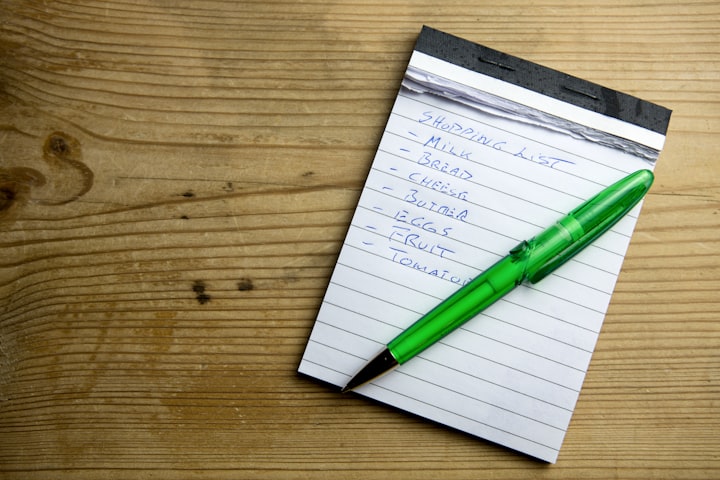How To Manage Your Tasks For Success
A Simple and Practical Guide to Better Manage Your Tasks

What system do you use to keep track of all you have to do? This appears to be a straightforward question, but the truth is that there are numerous options. Task management software is among them, as is 'keeping it all in my head.'
While this may appear to many of us to be expected, there is a problem. The issue is that our constantly changing task lists or to-do lists are failing us. It's usually because we don't stick to our lists or don't make them clear enough.
I know what you're thinking right now. Why should you make any changes to your system when it works so well?
That is an excellent and sincere inquiry. After all, it was the same question I asked myself when someone told me I was terrible at keeping track of all the things I needed to do. Yet, when we ask ourselves this question and honestly answer it, we discover that we may be missing.
In this article, I'll go over task lists in detail and show you how to construct a system to help you complete all of your tasks. It will also assist you in learning how to process your duties more efficiently and with greater clarity. Most importantly, it will be straightforward and practical, allowing you to make changes right away.
Why We Need Task Lists

Something needs to be grasped. We're not talking about to-do lists here; we're talking about task lists. To-do lists remind me of something we'll do, not something we're doing. Thus the language matters. Some of us find it simpler to procrastinate since it is written in the future tense.
So, for this post, we'll be discussing task lists. We have a lot of work to accomplish right now. While to-do and task are often used interchangeably in our world, this will not be the case where we are going.
Here is the vital question: Why do we need to keep task lists?
To begin, allow me to tell you a story. I used to work for a non-profit organization when I first got married. I gathered finances to work for this charity during the first year of our marriage. My success or failure was determined mainly by me.
I would usually see monies raised if I accomplished everything I needed to do. If I didn't, I'd be discouraged since I wouldn't know any money raised. I was also given new tasks throughout that first year of marriage. My wife and I collaborated to manage our bills and other responsibilities in our apartment.
This may not appear to be a large number, but the difficulty was that I was trying to keep track of everything in my head. It took a long time for me to collect the finances I needed to begin working in the profession I was born to do. My wife and I had numerous discussions along the road regarding the things I was required to complete during the week.
Around this time, I recognized I needed to make some adjustments.
Our Brains Aren't Designed to Store Everything
While I believe I am intelligent and capable of holding a large amount of information in my head, the truth is that I am not. For instance, if I go to the grocery store, I will forget more than three products. This is why I struggled to complete tasks for my job and fell behind on my commitments at home.
It turns out I'm not the only one. The ability to store knowledge in our brains is limited for all of us. According to a study conducted at Florida State University, people forget things because they have too many open tasks. It's based on a phenomenon known as the Zeigarnik effect.
The Zeigarnik effect says:
We all have 'mental interruptions' that we experience because of open tasks, even simple ones, that we are trying to keep track of in our minds. As a result, we fail to remember things we had gotten done and struggle to complete the things we need to do.
I was initially married and couldn't raise the finances I needed or handle home tasks. I was going through something similar. Every small thing I needed to accomplish kept interrupting my thoughts.
This is why task lists are necessary.
Why Your Task List Is Lacking
While there may be numerous reasons why your task list is effective, it might also be improved. Years of practice, experimentation, and research have led me to conclude that task lists are unproductive for three reasons.
- It is a work in progress. You have a lot of things on your mind that you haven't written down.
- It's not clear. You scribbled 'dad,' but you didn't explain why or what you needed to do.
- It's a little overwhelming. Your to-do list is a mile long, and you're at a loss for what to do with it.
Using David Allen's Getting Things Done approach, I first started keeping task lists. My tasks would be far too simple for me. I made a lot of impossible tasks and never truly put them all in my system. These unfinished and ambiguous jobs piled up on my to-do list and began to overwhelm me. In the end, I'd be unable to complete them.
How To Create Task Lists That Work

Simple lists serve as the foundation for all I do. That's right. We're talking about lists. But I also go into this in more detail. I began by following David Allen's principles, which may be found in his book Getting Things Done. Over time, I've refined these techniques into what you'll find here.
The steps to update your task list system and maintain it regularly are as follows.
No. 1 — How will you keep track of your to-do list?
Decide where you'll keep your list before you do anything else. Is it going to be on a notepad, journal, or notebook? Will you use Reminders, Asana, or Google Tasks, or will you use a digital tool like Reminders, Asana, or Google Tasks? It would help if you began here, regardless of what you wish to accomplish. Because of its simplicity, I like Apple Reminders.
№2 — Create your lists.
There need to be five main lists: Today, Next Action, Someday/Maybe, Waiting On, and The Tickler. The idea for these lists is as follows.
- Today: the few tasks you will focus on today (no more than 5 to 10).
- Next action: the next actions for any open project or tasks you need to do (This can be full, but they should only be next actions).
- Someday/Maybe: items that you may sometimes do, but they aren't a priority right now (this too will be a long list).
- Waiting On: things you are waiting to do either because of someone else or a task in your next action list (this will be a long list, but not as long as Someday/Maybe).
- The Tickler: a list full of things you want to do, but it isn't essential you do them now, and you may not know if you will ever do them. (This can be a long list, too, though mine is shorter because I tend to trash can a lot of things on this list)
No. 3 — Clear your head and write down tasks.
It would help if you physically got everything out of your head and onto the table to make this work. This entails writing down all tasks and ideas circling in your thoughts. It will appear like you have a lot of stuff in your inbox at first. But what you do next will help you clear out all of this mess.
№4 — Triage everything into the appropriate list.
Now that you have everything, it's time to put it into the appropriate task list. This is far simpler than you would think. It focuses on answering the following questions:
- Is this the next action for me to do? If so, put it in the next action list.
- Is this something I will have to wait for someone else? If so, put it on the 'waiting on' list.
- If it isn't something you have to wait on and it isn't a 'next action,' then put it in your Someday/Maybe list.
- Is this something I want to do? If so, put it in the Someday/Maybe list.
- If it isn't something you are sure you want to do, put it in the Tickler list, and you can review it another time.
№5 — Review your task list regularly.
I look at my task lists every day, and it doesn't overwhelm me. The key to checking your task lists early is to make sure you move tasks around each day for what you are doing.
If you complete tasks on your next action list, then move new ones into there as you can start working on them. The idea looks like this:
Tickler List to Someday/Maybe List to Next Action List to Today's List
Also, during your daily review of tasks, this is an excellent time to capture any other tasks you might have come to mind. Dump those tasks into an inbox and then triage them out to the different task lists. Then go about your day.
Final Thoughts
I believe that keeping things simple is preferable when it comes to task lists.
Creating a simple work list is to make it clean and concise. It doesn't have to be made up of thousands of layers or preserved in one place for it to be longer than your arm. It does, however, require some order. Making a few concentrated lists with specific tasks might help you get things done quickly.
There are no other options for keeping track of your tasks. Nonetheless, I am confident that this is the most excellent option.
About the Creator
J.R. Heimbigner
Author and creator, Husband and Father, Jesus Follower and Reader of Books
Reader insights
Good effort
You have potential. Keep practicing and don’t give up!
Top insight
On-point and relevant
Writing reflected the title & theme






Comments
There are no comments for this story
Be the first to respond and start the conversation.